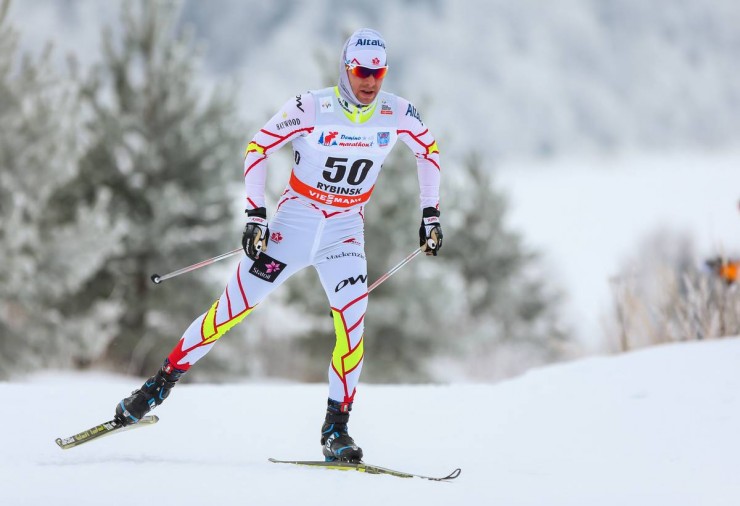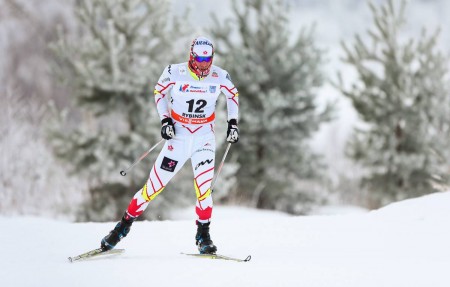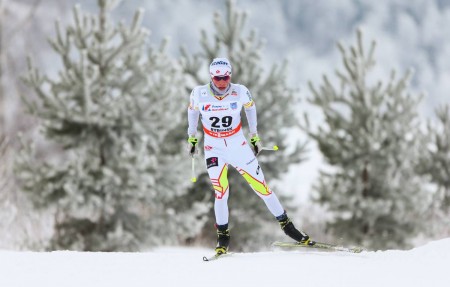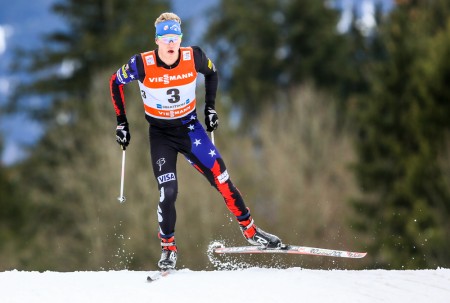
The North American men had mixed results while facing cold-and-snowy conditions in Rybinsk, Russia, during Friday’s World Cup 15-kilometer freestyle individual start.
Canada’s Alex Harvey took 10th and was the top North American finisher, ending up 1:15.7 behind Switzerland’s Dario Cologna, who won it in 36:53.4. The result elevated Harvey to 11th in the overall World Cup standings.
Although the field featured fewer top athletes than a usual World Cup race — with many of the leaders in the World Cup standings, including the top Norwegians, opting out of the races in Rybinsk — Harvey said in a phone interview that he was pleased with his top 10.
The 26 year old explained his first lap proved especially difficult, as the 5 k course features five significant climbs.
“I kind of struggled with my legs and everything so I couldn’t push too hard on the first lap, but I was feeling better and better so I was able to pick up some ranks from the 5 k mark on,” he said.
Harvey had the 20th-fastest time after 3.5 k, but his pace improved throughout the race, and he was 15th after 11.9 k.
“I think I skied well technically; it was kind of a cold snow so when you were on your edges it was pretty slow, but if you were able to hold onto a flat ski it was good,” Harvey explained.
He said he tried to glide as much as he could, and “took it down a notch” on the climbs for the sake of his legs.
“It was probably the best I could have done,” he said.
Harvey said that before the race he was unsure he would start. He came to Rybinsk thinking more about Saturday’s freestyle sprint and Sunday’s 30 k skiathlon, but decided to race after the temperature was not as cold as predicted.
“Doing three races in a row is always hard, but it was just -11 [degrees Celsius] so it wasn’t so cold. But had it been -15 or colder I probably would have skipped it,” he explained.

Also for Canada, Ivan Babikov finished 22nd (+1:53.3), despite not being able to ski as fast as he would have liked.
“Fresh, cold snow definitely made a big difference in speed compared to yesterday, so it was pretty hard to ski fast out there,” the 35-year-old Russian-born skier wrote in an email.
Babikov said he skied his second lap alongside France’s Maurice Manificat, who finished sixth (+1:03.8), and was able to stay with Manificat on the flat sections and gradual inclines. However, he lost him on the hills and was dropped 4 k into the second lap.
“I’m satisfied that I scored some points but I still lost a lot of time to the top ten,” Babikov explained. “My body was feeling good though and I’m looking forward to the [skiathlon] on Sunday.”
He is now 55th in the World Cup standings.
Meanwhile, teammate Devon Kershaw was disappointed with his day, in which he placed 36th (+2:42.3).
“I am sounding like a broken record these days, but it did not play out well out there on the course for me today. I feel devoid of power and on a course like this one — where the climbs aren’t too long or too steep — that’s a bad thing,” Kershaw wrote in an email.

The 32 year old described the course as a “real workhorse course” and said it is easy to either make up a lot of time or lose time on a difficult day.
Looking ahead, Kershaw was excited about the 30 k skiathlon.
“The courses here are some of my favorite on the World Cup, so good body, bad body — I don’t have a hard time getting excited to race on these tracks,” he wrote. “Sunday’s race is longer, has some classic, and is a mass start so the key is to be able to have the body to ski the leaders’ rhythm and try and conserve energy early.”
Kershaw’s best World Cup result this season was in Ruka, Finland, last November, when he took 14th in a 15 k classic individual start.
Canadian Graeme Killick, coming off a successful Nor-Am Cup where he won the skiathlon, finished 43rd (+3:18.5).

The two American skiers finished near the back, with Erik Bjornsen taking 40th (+2:50.0) and Matt Gelso placing 50th (+4:10.0) out of 53 racers.
However, Gelso was ill the week preceding Friday’s race. He wrote in an email that while suffering through a head cold he was not able to ski for multiple days and only managed a short ski on Thursday. Fortunately, he felt healthy on Friday and was able to race.
The 26 year old explained that he felt solid for the first lap and a quarter of the second lap, but began to struggle when he would have liked to increase his pace and stay competitive.
“There is a lot of sustained V1 on this course, and I did not have the tempo or pop I needed to ski these sections well. I felt solid on the flat and rolling sections, but unfortunately that made up a very negligible part of the course and so I struggled on the steeps with my slow and flat V1,” Gelso wrote.
Gelso explained he knew beforehand that this result was a distinct possibility after a week of sickness and little preparation, though he was still “extremely unhappy” with it.
“But that’s racing,” he wrote.
U.S. Ski Team Head Coach Chris Grover said in a phone interview that despite Friday’s results, the team is excited.
“Now that Gelso is feeling better, everybody is healthy,” he wrote.
He explained that the U.S. team only had five of their ten athletes starting on Friday, as the team is focusing on Saturday’s sprint and Sunday’s skiathlon. However, Gelso will not start on Saturday in order to focus on the skiathlon.



